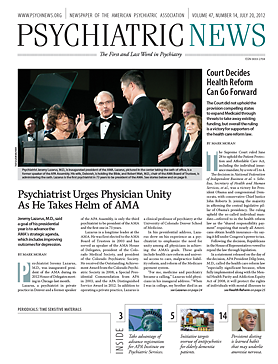In the face of a national shortage of psychiatrists and a sizeable increase in the mean educational debt incurred by medical students, it is critical that the government ramp up investment in indirect medical education (IME).
So contends APA in a May 15 letter to officials at the Centers for Medicare and Medicaid Services (CMS) urging the agency to rework its proposed rule on hospital payment reform that would result in diminished IME funding levels.
While the payment reductions would equally affect primary care and specialty residency programs, APA is particularly concerned about the potential threat to the already shrinking pool of students seeking a career in psychiatry.
“For Medicare beneficiaries with severe and persistent mental illness, a psychiatrist often functions as a primary care physician coordinating most or all of these patients’ health care,” wrote APA Medical Director James H. Scully Jr., M.D. “To meet the needs of America’s growing Medicare beneficiary population, the federal government must commit more federal funds to training medical residents in America’s teaching hospitals.”
According to CMS, the 323-page proposal is designed to promote improved hospital care through an update of Medicare payment policies and rates for inpatient stays at general acute care hospitals and long-term-care hospitals paid under prospective-payment systems.
But APA is concerned that proposed changes to how teaching hospitals are compensated for care delivered by residents will result in reduced funding for these hospitals and potentially dissuade students from applying for medical residencies.
In particular, APA questioned CMS’s proposed method for counting beds at teaching hospitals. By allowing for the addition of delivery and labor beds to teaching hospitals’ overall bed count, the bed-to-resident ratio will drop at each hospital.
This ratio is the means by which IME payments to teaching hospitals are calculated, and CMS estimates that the revised bed count calculation outlined in the proposal will lead to a $170 million reduction in IME payments in Fiscal 2013.
APA also weighed in on CMS’s proposal to consider additional factors in the agency’s ranking of teaching hospitals that apply for resident slots to be redistributed by CMS from nearby hospitals that have closed.
The current slot-ranking criteria afford hospitals applying for a primary care or general surgery residency program a means of having their applications for additional residency positions preferentially reviewed.
The two newly proposed criteria would provide greater leeway to hospitals that are seeking residency programs in specialty areas such as psychiatry, but only when co-occurring with a request for primary care programs.
While APA welcomes such a move, it remains concerned that primary care programs will continue to be disproportionately ranked for preferential consideration at the expense of psychiatry residencies.
“A dwindling number of psychiatry residency slots populate America’s teaching hospitals at a time when a greater percentage of Americans, in particular Medicare beneficiaries, are suffering from mental illness,” Scully stressed.
While primarily emphasizing the importance of IME funding to the training of resident physicians, APA also praised CMS for its proposal to expand the period during which teaching hospitals can establish new residency programs from three years to five years.
CMS plans to issue a final rule by August 1.

